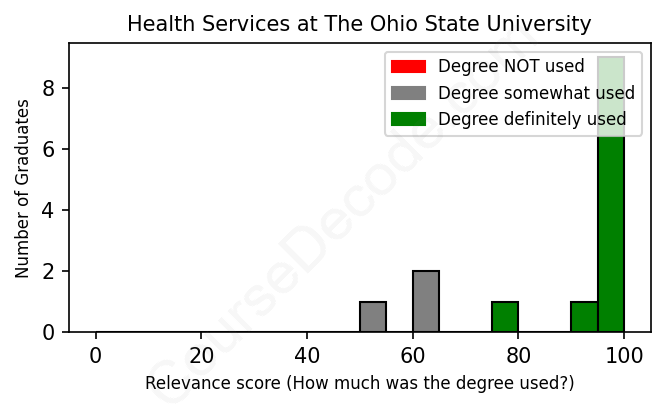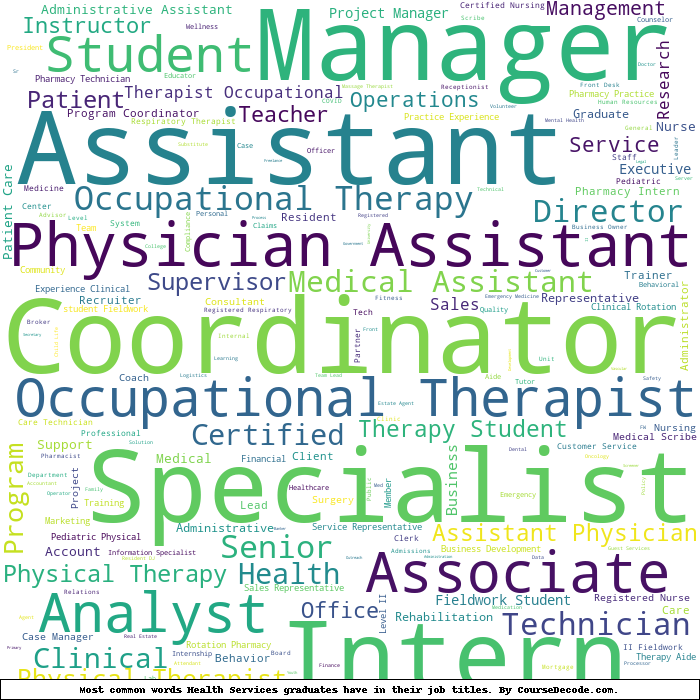
First, some facts. Of the Health Services graduates from The Ohio State University we've analyzed , here's how many have used (or NOT used) their degree in their career:

These are estimates based on AI analysis of 14 LinkedIn profiles (see below).
The verdict? Great! Overall, with an average relevance score of 88%, Health Services graduates from The Ohio State University have a substantially higher likelihood (+21%) of finding work in this field compared to the average graduate across all fields:
And for comparison, here's the chart for all profiles we've looked at across all degrees.
Also, after graduating, 50% of these graduates have pursued further education other than another Bachelor's degree (such as a Masters degree or other), compared to the average across all profiles of 35%. This suggests you may need more than just a Bachelors degree to be competitive as a Health Services graduate.
See the details:
|
Relevance score: 100% We think this person has gone into a career highly relevant to their degree. We think this person has gone into a career highly relevant to their degree.
DEGREE INFOGraduated in 2020 from The Ohio State University with a Bachelor of Health Sciences in Health Services. No other secondary education since. JOB HISTORY SINCE GRADUATIONPharmacy Operations Manager Walgreens Apr 2021 - Present ABOUTNo information provided. |
The top 10 most common jobs done by the graduates we've analyzed (ranked most common to least) are:
When looking at the LinkedIn profiles of graduates from The Ohio State University's Health Services program, a clear trend emerges in their job roles. Many individuals find themselves in positions that revolve around healthcare administration, patient care, and process improvement within various medical settings. Common titles include Process Improvement Specialist, Clinical Data Analyst, and Psychiatric Nurse Practitioner, demonstrating that graduates often head toward roles that directly relate to health services and management. Additionally, there are quite a few roles focused on behavioral health and rehabilitation, indicating a significant emphasis on mental health services.
However, not all jobs are as closely aligned with their degree. Some, like Administrative Internships and Medical Secretary positions, tend to focus more on administrative duties that don’t fully utilize the specialized healthcare knowledge gained during their studies. While these roles contribute to healthcare delivery, they might not offer the same level of direct relevance to the core principles taught in a Health Services degree. Overall, though, a good number of graduates are definitely landing jobs that strongly connect back to their education, particularly in areas like clinical roles and healthcare management.
Here is a visual representation of the most common words in job titles for Health Services graduates (this is across all Health Services graduates we've analyzed, not just those who went to The Ohio State University):

When you look at graduates from The Ohio State University with a degree in Health Services, it's clear that a lot of them are carving out solid careers in the healthcare sector right from the start. Many of the first jobs these grads land after graduation seem to lean toward roles in hospitals or health organizations, such as specialists, administrative roles, or various nursing positions. For example, someone might start off as a process improvement specialist at a children's hospital or even jump into a nursing position fairly quickly. These positions often give them valuable experience that sets the stage for upward mobility in their careers.
Fast forward 5 to 10 years, it's impressive to see how many of these individuals have progressed. Many have moved into managerial or director-level roles, indicating a strong trajectory within their chosen fields. This isn't just a random selection of jobs; it really shows that these graduates are sticking with healthcare and often rising through the ranks. Whether it's transitioning to roles like Service Line Administrator or Director of Market Operations, the pattern suggests that a degree in Health Services from Ohio State can lead to stable and rewarding careers in healthcare. It’s pretty encouraging if you're considering this pathway yourself! While there are some who may have taken more circuitous routes or found themselves in less directly related jobs, the overall trend reflects a successful journey in the health services sector for many alumni.
Honestly, a Bachelor’s degree in Health Services can be a mixed bag when it comes to difficulty, and it often depends on your background and interests. At The Ohio State University, you'll find that the program covers a lot of ground—everything from healthcare systems to policy, and some courses can be pretty challenging, especially when it comes to understanding complex regulations or statistics. However, it’s generally considered a bit easier than, say, a hard science major like engineering or biology, mainly because it leans more on theory and discussion rather than heavy lab work or intense math. If you're passionate about health and enjoy working through concepts rather than crunching numbers, you might find it manageable and even enjoyable!
Most commonly, in the LinkedIn profiles we've looked at, it takes people 4 years to finish a Bachelor degree in Health Services.
Looking at this group of health services graduates from Ohio State, it seems like they've been doing pretty well for themselves overall, especially the ones who graduated earlier. For instance, the 2012 grad has climbed the ranks at Nationwide Children's Hospital, moving up to a Service Line Administrator, which typically comes with a solid paycheck. The 2013 grad who became a VP at WellMed is likely raking it in, too, since that's a big leadership role. Others, like those who went into nursing and healthcare administration, also appear to be on stable career paths, though some roles at the entry level might not pay as much initially (like the 2020 graduates starting with positions like medical scribe and medical secretary). Overall, many of these grads seem to be making decent money, especially as they gain experience in the healthcare field.
Here is a visual representation of the most common words seen in the "about" section of LinkedIn profiles who have a Bachelor degree in Health Services (this is across all Health Services graduates we've analyzed, not just those who went to The Ohio State University). This may or may not be useful:

Here are all colleges offering a Bachelor degree in Health Services (ordered by the average relevance score of their Health Services graduates, best to worst) where we have analyzed at least 10 of their graduates:
| College | Score | Count |
|---|---|---|
 The Ohio State University The Ohio State University
|
88 | 14 |
 Quinnipiac University Quinnipiac University
|
88 | 10 |
 Grand Valley State University Grand Valley State University
|
87 | 16 |
 University of Tampa University of Tampa
|
87 | 10 |
 Stony Brook University Stony Brook University
|
80 | 15 |
 Boston University Boston University
|
79 | 12 |
 University of Connecticut University of Connecticut
|
78 | 26 |
 Florida Agricultural and Mechanical University Florida Agricultural and Mechanical University
|
76 | 12 |
 Texas A&M University Texas A&M University
|
72 | 16 |
 University of South Florida University of South Florida
|
72 | 26 |
 Boise State University Boise State University
|
71 | 11 |
 University of Central Florida University of Central Florida
|
68 | 47 |
 Florida Gulf Coast University Florida Gulf Coast University
|
68 | 10 |
 James Madison University James Madison University
|
66 | 26 |
 University of Missouri-Columbia University of Missouri-Columbia
|
66 | 17 |
 California State University, Fullerton California State University, Fullerton
|
66 | 13 |
 California State University - East Bay California State University - East Bay
|
66 | 10 |
 Arizona State University Arizona State University
|
62 | 10 |
 Cleveland State University Cleveland State University
|
60 | 10 |
 Stockton University Stockton University
|
58 | 12 |